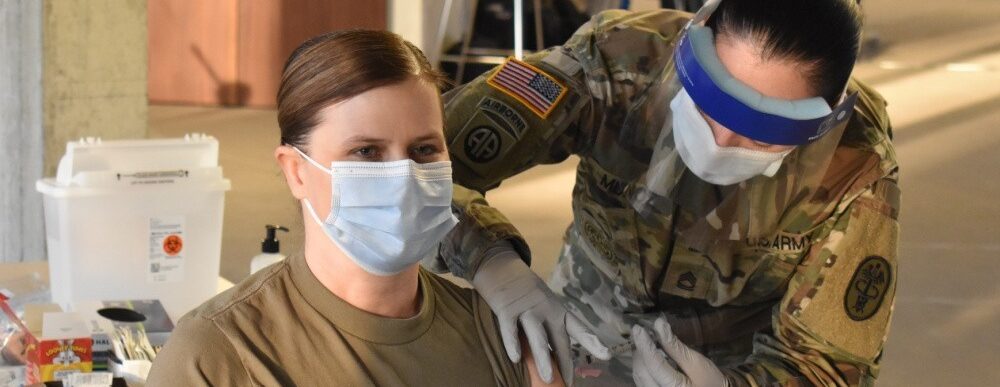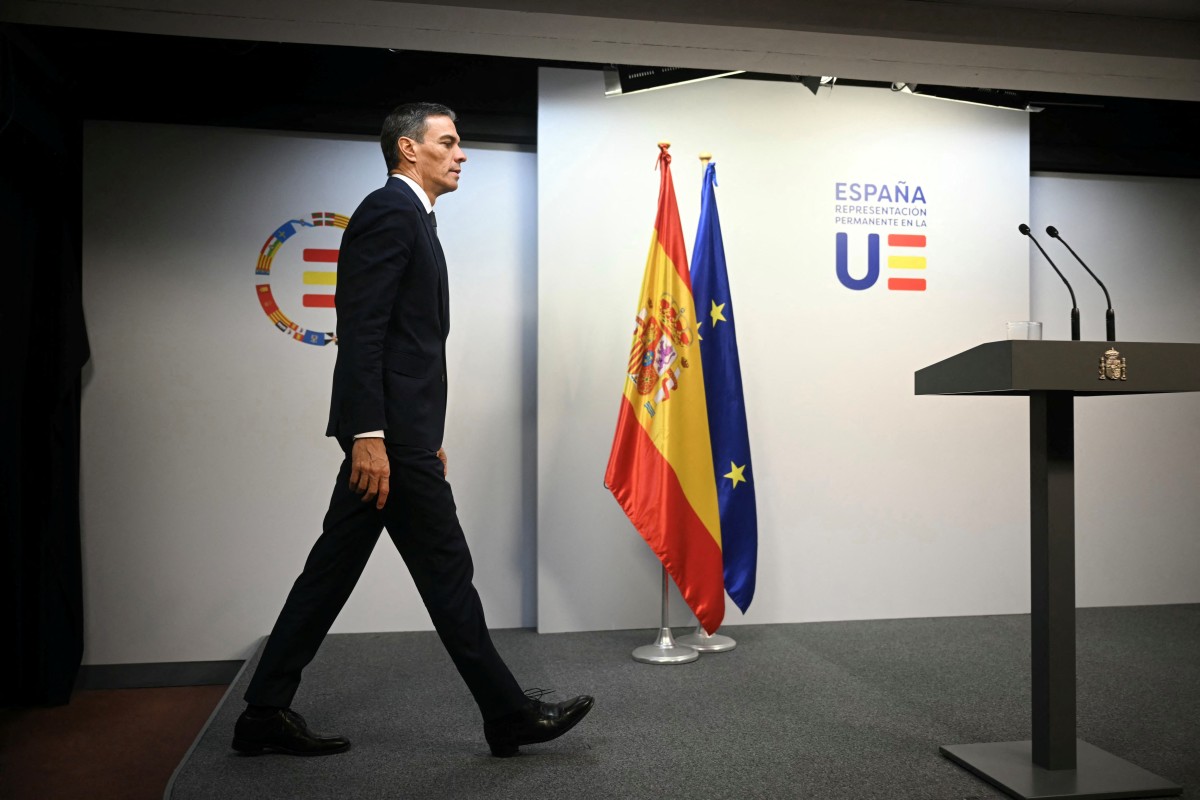International
US Navy says sailors who refuse vaccine will be expelled

AFP
The US Navy said Thursday that personnel who refuse to be vaccinated against Covid-19 will be expelled from the force, ahead of the November 28 deadline for the injection.
“With Covid-19 vaccines now mandatory for all military members, the Navy has announced plans to start processing for discharge those who refuse vaccination without a pending or approved exemption,” it said in a statement.
It was the first clear indication by the Pentagon of what would happen to service members who reject the vaccines, which became mandatory at the end of August.
Until now military officials had avoided answering what would happen to those who refuse to be vaccinated.
The navy said that 98 percent of its 350,000 active duty members had begun or completed the vaccination process.
For the US military overall, Pentagon spokesman John Kirby said Tuesday that 96.7 percent of the nearly 1.4 million active duty personnel had received at least one dose, and 83.7 percent two doses.
Including military reserves, though, the level was just 80 percent with at least one dose.
If all the services take the same hard line that the navy is taking, it risks losing as many as 46,000 troops, though presumably more will accept vaccinations before the deadline.
Vice Admiral John Nowell, the chief of naval personnel, said the navy force has been hit with 164 coronavirus deaths since the pandemic began.
Of them 144 were known to have not been immunized, while the status of the other 20 was unclear.
People expelled for refusing the vaccine will receive a general honorable discharge, but could lose certain benefits or be forced to repay the cost of training and education in some cases, the statement said.
Navy personnel who can claim an exemption from mandatory vaccines, for health or other reasons, can be reassigned from their current duties.
The navy has been particularly sensitive to the pandemic, because of the risk that a single Covid case could infect an entire ship or submarine at sea, forcing it out of action.
Last year the aircraft carrier USS Theodore Roosevelt was struck by an outbreak that infected around a quarter of the 4,800 crew, forcing the warship to remain in port in Guam for disinfection for several weeks.
International
Winter Storm Fern Leaves 30 Dead and Over One Million Without Power Across the U.S.

The massive winter storm Fern, bringing polar temperatures, battered large portions of the United States for a third consecutive day on Monday, leaving at least 30 people dead, more than one million households without electricity, and thousands of flights grounded.
In the Great Lakes region, residents awoke to extreme cold, with temperatures dropping below -20°C. Forecasts indicate that conditions are expected to worsen in the coming days as an Arctic air mass moves south, particularly across the northern Great Plains and other central regions, where wind chills could plunge to -45°C, temperatures capable of causing frostbite within minutes.
Across the country, heavy snowfall exceeding 30 centimeters in roughly 20 states triggered widespread power outages. According to PowerOutage.com, nearly 800,000 customers remained without electricity on Monday morning, most of them in the southern United States.
In Tennessee, where ice brought down power lines, approximately 250,000 customers were still without power. Outages also affected more than 150,000 customers in Mississippi and over 100,000 in Louisiana, as utility crews struggled to restore service amid dangerous conditions.
International
Spain approves plan to regularize up to 500,000 migrants in Historic Shift

In November 2024, Spanish Prime Minister Pedro Sánchez announced a reform of the country’s immigration regulations aimed at regularizing 300,000 migrants per year over a three-year period, in an effort to counter population aging in a country where births have fallen by 25.6% since 2014, according to official data.
Going against the trend in much of Europe, Spain’s left-wing government has now approved an exceptional migrant regularization plan that could benefit up to 500,000 people, most of them from Latin America.
The measure will allow the regularization of around “half a million people” who have been living in Spain for at least five months, arrived before December 31, 2025, and have no criminal record, Migration Minister Elma Saiz explained on public television.
The plan, approved on Tuesday by the Council of Ministers, establishes that applications will be processed between April and June 30, enabling beneficiaries to work in any sector and anywhere in the country, Saiz said.
“Today is a historic day for our country. We are strengthening a migration model based on human rights, integration, and one that is compatible with economic growth and social cohesion,” the minister later stated at a press conference.
The socialist government of Pedro Sánchez stands out within the European Union for its migration policy, contrasting with the tightening of immigration measures across much of the bloc amid pressure from far-right movements.
Central America
Honduras swears in conservative president Asfura after disputed election

Conservative politician Nasry Asfura assumed the presidency of Honduras on Tuesday with an agenda closely aligned with the United States, a shift that could strain the country’s relationship with China as he seeks to confront the economic and security challenges facing the poorest and most violent nation in Central America.
Asfura’s rise to power, backed by U.S. President Donald Trump, marks the end of four years of left-wing rule and secures Trump another regional ally amid the advance of conservative governments in Chile, Bolivia, Peru, and Argentina.
The 67-year-old former mayor and construction businessman was sworn in during an austere ceremony at the National Congress, following a tightly contested election marred by opposition allegations of fraud and Trump’s threat to cut U.S. aid if his preferred candidate did not prevail.
Grateful for Washington’s support, Asfura—who is of Palestinian descent—traveled to the United States to meet with Secretary of State Marco Rubio, before visiting Israeli Prime Minister Benjamin Netanyahu.
“We need to strengthen relations with our most important trading partner,” Asfura said after being declared the winner of the November 30 election by a narrow margin, following a tense vote count that lasted just over three weeks.
-

 Central America5 days ago
Central America5 days agoGuatemala’s president rules out negotiations with inmates after prison riots
-

 Central America2 days ago
Central America2 days agoGuatemala seizes over a ton of cocaine hidden in flour at Pacific port
-

 International4 days ago
International4 days agoTrump-Era Defense Plan Prioritizes Border Security and Scales Back Global Commitments
-

 Internacionales5 days ago
Internacionales5 days agoMajor winter storm threatens “catastrophic” ice and snow across much of the U.S.
-

 International4 days ago
International4 days agoBogotá and Quito Seek Dialogue After Tariffs and Power Cut Escalate Tensions
-

 International3 days ago
International3 days agoDelcy Rodríguez seeks political agreements after Maduro’s ouster
-

 International5 days ago
International5 days agoGuatemala considers sending high-risk gang members to military prisons
-

 International2 days ago
International2 days agoHistoric snowstorm paralyzes Toronto after 60 centimeters of snow
-

 International2 days ago
International2 days agoSpain’s irregular migrant population rises to 840,000, study finds
-

 International3 days ago
International3 days agoFederal immigration agents kill man in Minneapolis, sparking protests and outrage
-

 International5 days ago
International5 days agoRights group says over 5,000 killed in Iran protests, mostly civilians
-

 Central America23 hours ago
Central America23 hours agoGuatemala Police Arrest Prison Guard Caught in the Act of Extortion
-

 Sin categoría22 hours ago
Sin categoría22 hours agoEight Killed in Series of Armed Attacks in Ecuador’s Manabí Province
-

 International23 hours ago
International23 hours agoWinter Storm Fern Leaves 30 Dead and Over One Million Without Power Across the U.S.
-

 Central America23 hours ago
Central America23 hours agoHonduras swears in conservative president Asfura after disputed election
-

 International23 hours ago
International23 hours agoDoomsday clock moves to 85 seconds before midnight amid rising global risks
-

 International2 days ago
International2 days agoRights group says nearly 6,000 killed in Iran protest crackdown
-

 Central America23 hours ago
Central America23 hours agoBukele leads public trust rankings as UCA survey highlights gains in security
-

 International23 hours ago
International23 hours agoSpain approves plan to regularize up to 500,000 migrants in Historic Shift
-

 International2 days ago
International2 days agoVenezuela frees at least 80 political prisoners, NGO says
-

 Sin categoría23 hours ago
Sin categoría23 hours agoEl Salvador Launches Fourth Year of Ocean Mission to Protect Marine Ecosystems
-

 International2 days ago
International2 days agoEU launches new probe into X over AI-generated fake nude images
-

 International2 days ago
International2 days agoSevere winter storm grips U.S., leaves multiple dead as extreme cold persists
-

 International2 days ago
International2 days agoFrance debates ban on social media for children under 15


























